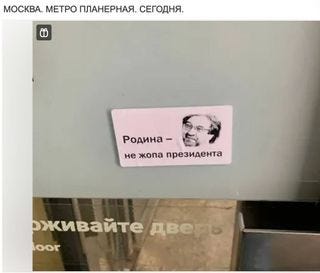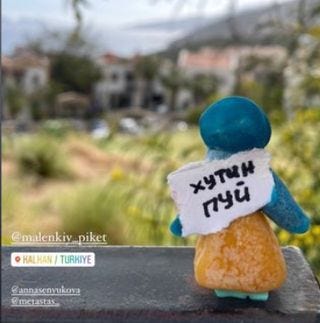Hello,
“Do you know a good joke?”
In Russia, this question is so ubiquitous, it’s almost rhethorical. Everyone knows jokes, or, as they are called in Russian, “anekdoty”. Moreover, everyone knows a recent anekdot. Moreover, there are times where a poorly timed anekdot would lead to the joketeller’s arrest, imprisonment, and even death. And such times are impending again. Gallows humor, an important coping mechanism, is strong as ever.
So, yeah, jokes are important in Russia.
There are no knock-knock jokes in Russian, and they don’t translate well. What sets anekdoty apart from regular jokes, I think, is a necessity of at least some basic narrative or context. So, most pun-based jokes I know, for instance, are about a famous Russian TV series character, a WWII spy called Stierlitz (we might get to those some other time; they are a translator’s nightmare). Most rude jokes are about another movie character, lieutenant Rzhevsky (we might get to those some other time as well), and so on.
I will begin a series of translations of my favorite anekdoty, because I believe they are an important and often overlooked genre of Russian folk fiction. Some of them are true micro short stories, masterstrokes of laconic humor. Some of them are just incredibly silly, an exercise in absurdism. Some of them are about what Russians are feeling in the depth of their hearts.
I will start with a topical and recent collection: anekdoty about Putin and the war. Most of these I took from an amazing article by an anthropologist Alexandra Arkhipova, who collects and analyzes modern anekdoty. I will also use pictures from an online exhibition website, NOWOBBLE.NET, run by her, where she collects modern anti-war and anti-government Russian street art.

Anekdoty about Putin
Putin, some Duma congressmen and some ministers go to the Kremlin cantina. The serving lady asks:
“What would you like?”
“I’m having meat.”
“And the vegetables?”
“The vegetables are also having meat.”The National Guard generals appeal to Putin and ask him to release the opposition members from prison.
“But why?”
“So there will be more demonstrations.”
“Why??”
“Well, our troops prefer to beat unarmed women, and not die from Ukrainian bullets.”Putin, after the Kursk incursion, is summoning Stalin’s ghost.
Stalin: “What’s wrong?”
Putin: “Nazis are circling Kursk! My army is retreating! What should I do?”
Stalin: “Do what I did in 1943. Send the best Ukrainian troops and ask US for help.”“How can Putin save face?”
“In formaldehyde.”
Anekdoty about Russians during the war
Alexandra Arkhipova makes an observation that after the beginning of the war, there are almost no new jokes about Putin, a prominent character since early 2000s. Instead, a new common anekdoty character emerged: a “man on the street”, a normal Russian, unsure and scared.
“Good morning, here is your conscription notice.”
“Who are we fighting with?”
“Fascists, of course!”
“Ok, and against whom?”“Did you hear that they erected a George Orwell monument in Russia?”
“Where?”
“Honestly, almost everywhere.”My son wears an “I’m With Putin” t-shirt for the last two weeks. Since then he was beaten, spat at, thrown bottles at. I’m afraid to think what will happen, if he ever dares to leave the house.“Where did the symbol ‘Z’ come from?”
“It’s half a swastika.”
“Where is the other half?”
“Got stolen.”2023, a dialogue in a prison truck.
“Do you know, which concentration camp are we sent to?”
“No, I’m not into politics.”A guy runs into a pharmacy.
“Give me antidepressants—Xanax, Zoloft, Prozac, everything!”
“Do you have a prescription?”
“What, the Russian passport is not enough?”“What’s wrong?”
“I bought an apartment with a 'smart house’ system. And while I was at work, my apartment relocated to Kazakhstan.”Rabinovich, a Russian-speaking Jew, was a very common Soviet anekdoty character, and it is symbolic to see his return in 2024. I have a collection of Soviet-era anekdoty about him, which in part overlaps with stories from the Talmud.
“Rabinovich, we are here to arrest you for discrediting the Russian army.”
“But I haven’t discredited the army!”
“Go ahead then, hurry up then, we don’t have much time!”
Anekdoty about Russian soldiers
These are a little harsher; the humour is often very dark.
A Russian soldier calls home.
“Mom, I’m a POW!”
“Where?”
“In Ukraine.”
“Ukraine? Exchange some dollars!”A Russian soldier calls home.
“Mom, I’m a POW in Ukraine!”
“Who are you?”
“I’m your son!”
“TV said I have a daughter.”A Russian soldier calls home.
“Mom, I’m in Ukraine. They are shooting at us, I’m hiding in some hut here, it’s a meatgrinder!”
“No-no, we don’t need a meatgrinder; get a blender instead.”“Why is your son dead in a zinc-lined coffin?”
“I don’t know, I’m not into politics.”
As usual, I am curious whether this topic is as interesting to you as it is to me, so please comment. And if you know other jokes about Putin and the war—share them here.
Best,
Ꙝ






These are terrific! My husband lived in Leningrad and Moscow from 1986 to 1988 and brought back some great anecdaty from that era. Here’s a typical one:
A man is waiting in a bread line and, after hours of waiting, gets to the front, only to discover they’re all out. Frustrated, he loudly curses the government. A retired KGB officer hears him and says, “In my day, if you had said that, we’d have you shot!”
The man goes home, and when his wife sees that he’s empty handed, she asks, “Did they run out of bread?”
The man shakes his head and says, “It’s worse than that. They’ve run out of bullets.”
Um, I didn't find the jokes very funny, sorry. Different culture I guess. But I know a Soviet joke which I like:
A man goes into a fish shop by mistake. He asks for some cuts of meat. The shop assistant says to him:
"This is a fish shop. Here we have no fish. Next door, that's the meat shop. That's where they have no meat."
A typical cynical Soviet joke. 😄